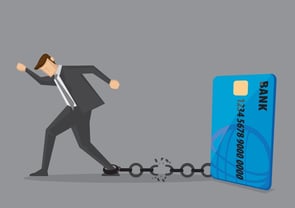 Americans are drowning in a sea of debt. Credit cards, first and second mortgages and car loans are creating an ever-rising tide that is slowly swallowing people's ability to live prosperously.
Americans are drowning in a sea of debt. Credit cards, first and second mortgages and car loans are creating an ever-rising tide that is slowly swallowing people's ability to live prosperously.
According to an Investopedia article, 43 percent of all Americans spend more money than they make each year. Instead of budgeting, living within their means and saving for rainy days and emergencies, they lean heavily on credit cards to pay their bills.
But that won't actually happen for years, according to one estimate that puts the number of Americans with more than $20,000 worth of debt at a staggering (but somewhat unsurprising) 2 million.
That's 2 million Americans who will spend the next 24 years toiling away to pay off their credit cards and struggling to stay afloat while they wait for payday to roll around.
Debt: The American Dream
It's actually not all that surprising that so many Americans are drowning in debt. Over the years, consumption has supplanted saving as the preferred way to enjoy all this great country has to offer. Here's why:
- Debt has been normalized. Once upon a time, debt was considered something to avoid. Foreclosures and bankruptcies were embarrassing. People worked hard, scraped by, and did without to avoid going into debt.
Not anymore.
These days, debt has been normalized. Big companies frequently file for bankruptcy. The housing bubble that burst after the Wall Street meltdown in 2008 left neighborhoods decimated by people who had no other choice but to walk away from their homes. Consumerism at any cost is hailed as the elixir for what's ailing our economy.
Nobody seems to think twice about using credit cards to pay for dinner, vehicle repairs, new televisions, toys, trips and even mortgages. Most of the time, the decision to pay with plastic isn't even conscious. The bill comes, the credit card comes out, and monthly payments that are incredibly difficult to dispose of start appearing in your mailbox. - It happens in a financial instant and by accident. Very few people set out to accumulate large amounts of unsecured debt—and certainly no one who practices prosperity economics. For most people, it happens by accident.
Many people start by attempting to use debt to manage cash-flow, build credit or even secure airline "points" so they can save money on vacations. At first, the low monthly payments are manageable, but then things change.
The debt grows with a dinner here and some fuel for your vehicle there. Incomes decrease unexpectedly while inflation increases. Before you know it, you're facing a tidal wave of a monthly payment and you don't have a life preserver other than taking on new debt. - It's easy to ignore—until it isn't. Humans seem naturally predisposed to ignore and avoid things that make them uncomfortable. And few things make people as uncomfortable as debt.
So it gets ignored.
Statements get tucked away and hidden. Difficult conversations about budgets get ducked. All the associated stress gets suppressed. And by the time you finally face the facts that you're drowning in debt, it's too late and drastic action must be taken. Nobody who practices prosperity economics ever wants to make decisions under duress because they typically turn out to be bad decisions. - Debt quickly becomes a way of life. At first, the stress associated with facing large monthly debt payments is jarring. But over time, people tend to get used to it. Even though they aren't getting anything for their money, they become resigned to the fact that they'll have to make the payment every month.
What could they do about it anyway, right?
So instead of figuring out a strategy to get out of debt, they dutifully make their payments every month. It is, after all, much more comfortable to ignore a problem than it is to face it head on.
There is no easy way out—but there is a way
It's easy to get down about your debt. It's an albatross that can cause you to feel paralyzed with fear, unable to think clearly and unable to see a way out.
Of course there is a way out, especially for anyone who is willing to commit to the principles of prosperity economics. But it won't be easy. In fact, anyone who tries the "easy" way out of debt is likely to fail. There simply aren't very many viable and simple solutions to debt.
To succeed, you have to be willing to do the extremely hard work of understanding your debt, putting together a smart and strategic plan to attack it, and then following through on your plan.
The reason you have to understand how you got into debt is because, more often than not, the way you got into debt will affect how you get out of debt. There are two ways people most commonly get into debt: making it a habit and finding yourself in the throes of an emergency.
Those who make debt a habit use credit cards to pay for daily expenses. They use them for gas, groceries, eating out and even paying for a bottle of wine on a Friday night. Their credit cards (and the associated debt) are just a normal part of their everyday lives; it's how they make ends meet.
Those who are in debt as a result of an emergency probably never saw the tidal wave of monthly payments bearing down on them. They live within their means and always have, but something serious and unexpected happened that forced them to take on debt to make it through. Maybe it was a layoff; maybe it was a medical emergency. Whatever the cause, they are not in a bad financial situation.
The solution for those who are in debt due to their habits is likely simple, but it's never easy. They need to increase their income, decrease their expenses and change their habits. For those who find themselves in debt due to an emergency, the solution typically involves extra measures, including liquidating assets, significantly increasing income or even filing for bankruptcy protection.
What to do when you're drowning in debt
If you are one of the millions of Americans drowning in debt, you need to know that there is hope. You can get out of debt, but it won't be easy. You'll need to be smart. You'll need to have a plan. And you'll need to execute.
The first thing you need to do is remain calm. People who panic often try to take the easy way out (see: debt settlements via the "debt help industry"), which almost never works.
The second thing you need to do is leverage the power of prosperity economics to develop an effective debt relief strategy. The third thing you need to do is remain true to the principles of prosperity economics to execute your plan and follow your road map to financial freedom.
Here's a look at what good M.A.P.S. to financial freedom look like, according to renowned financial author Kate Phillips:
- M = Mindset. Start with a positive mindset. If you believe that you will get out of debt, you are much more likely to succeed.
- A = Action. If you never take action, your situation will never change. And the action you take must be consistent. You can plan to earn more, spend less and cut expenses—but it's up to you to execute.
- P = Plan. Your plan to become debt free needs to be realistic and actionable. If it's not, it's not likely to work. There are many plans that align with the principles of prosperity economics—creating a "debt snowball" in which you commit extra funds to tackle smaller debt first and then roll those funds to the next until each debt is gone, for example. Your job is to find the plan that works best for you and then stick with it.
- S = Support. Even if you know everything there is to know about prosperity economics, you are going to need support. Paying off debt isn't easy. It will take intestinal fortitude, focus and an unwavering commitment to accomplishing your goals.
Find someone who understands prosperity economics and discuss your plan—debt snowball, negotiating with creditors, even bankruptcy (which can be a viable option under certain circumstances). It's always a good idea to run your plan by someone who understands and appreciates the principles of prosperity economics so you'll have the support you need to stay on the right path.
Getting support from an expert will make your swim out of the sea of debt a lot more manageable.
Build a lifeboat to a brighter financial future
Believe it or not, you can find your way out of debt. All you need to do is build yourself a lifeboat to a brighter financial future—and then row as hard as you can for as long as you can.
And once you are free from the riptides of debt, keep rowing! The skills you've learned and habits you've developed will keep paying off well into the future.
Sent from the Land of Possibilities!





Leave a comment